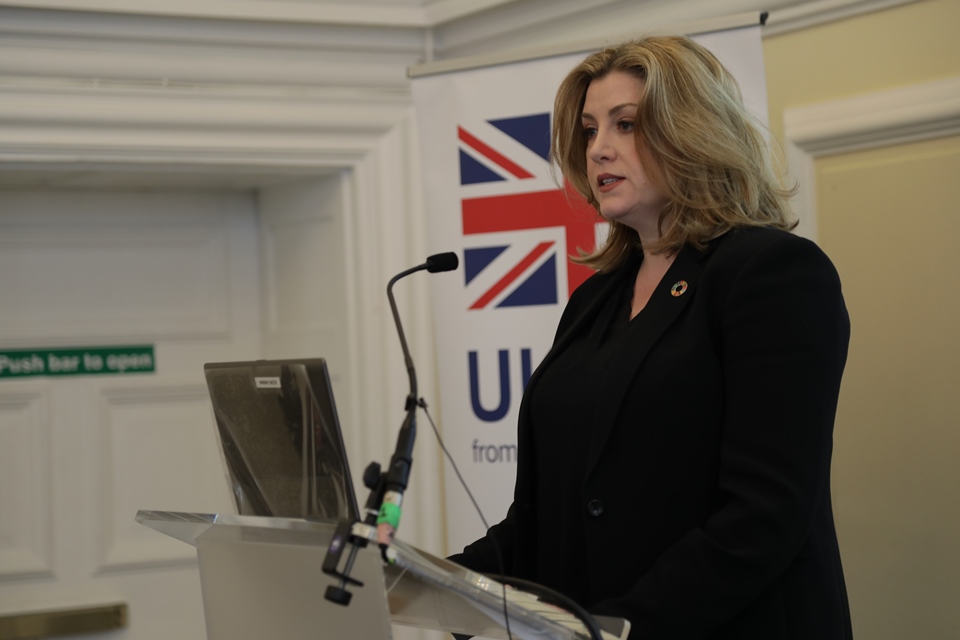Penny Mordaunt's speech at Safeguarding Summit
A safeguarding summit held to drive up standards and take bold steps to tackle sexual exploitation within the international development sector.

Thank you for being here on this important day.
Today we will start the vital change this sector needs.
Your task is to start laying the foundations to rebuild the credibility of the aid sector on this issue, both here and overseas.
Today, I want you to come up with the ideas and initiatives we can take forward the practical tools, processes and protocols to ensure we protect the people we are here to serve.
Unless, we do all we can to prevent wrongdoing, and unless we can hold all those who do wrong to account, we will have failed in our duty to protect the most vulnerable.
As you know, I wrote to every UK charity, which receives UK aid directly, asking that they provide me with a statement of assurance on four key areas:
Their safeguarding environment and policies, their organisational culture, their clarity and transparency, and their handling of allegations and incidents.
I also asked them to confirm that they have referred any and all concerns on specific cases and individuals to the relevant authorities, including prosecuting authorities.
All 179 organisations have given me their statement of assurance, and many gave additional details on reporting and allegations.
We are following up with 37 organisations to gain further clarity on their assurance, or reporting, and will issue a summary of all our analysis when this work is complete
But this exercise is not just about receiving assurances.
It marks the starting point from which we must now build.
Across the returns, we saw important examples of good practice, but overall, there was too little evidence in the areas of robust risk management, comprehensive reporting, responsibility being taken at the highest level for safeguarding, and of beneficiaries always being put first.
So if we are to meet our duty, then the sector must raise standards.
I am determined that DFID will play its full part in this.
So, from today, DFID will put in place new, enhanced and specific safeguarding standards for the organisations we work with.
These standards will include an assessment of codes of conduct, how organisations identify and respond to incidents, and how their risk management places safeguarding and beneficiaries at the very core.
That assessment will set the bar at a level of the very best - a bar that we will continue to push higher – from our work here today and in the time to come.
Our standards will be world-leading. They will be tough and exacting. Organisations should not bid for new funding unless they are prepared to meet these tough new standards.
We will not approve funds to them unless they pass our new standards.
We will also start to apply these new standards to organisations we have ongoing work with.
And will ensure that all those standards can apply to all our partners, big and small.
DFID is holding itself to these high standards we expect of others and today, I can also confirm that DFID’s internal review into historic allegations involving DFID staff has concluded.
Our Permanent Secretary Matthew Rycroft will say more on this later, but I think it was vital that we went back through every record we have, since they began, to check action has been taken. And if any new information comes to light through our continued efforts we will ensure appropriate action is taken on this.
The sector must do the same, and pay particular attention to the issue of reviewing and reporting historic cases. We expect all who wish to work with us, and indeed any organisation that works on development, to take this issue as an urgent priority.
Why?
Because only by reporting can we identify and bring to justice predatory individuals.
And it is those predatory individuals who concern me most.
My message to those who have sought to exploit this sector and the human tragedy in which it operates, is this – we will all share information we have with law enforcement.
We will find you.
We will bring you to justice.
Your time is up.
This summit is a critical moment to learn lessons and drive up standards across the entire aid sector.
Now is the time for action and for the British aid sector to take a lead. To set standards, a template and an example, for the rest of the world to follow.
To keep people safe we need to find a way staff can be properly vetted and monitored as they move between organisations and countries.
We need to find a way to hear the voices of the people we serve, so we can respond when they tell us they are being mistreated.
Would the Oxfam case, or the abuse of women in Syria, have persisted if those victims’ voices were listened to?
And we must have thorough assurance and auditing of the sector.
We must share our ideas and learn how to keep on improving our safeguarding measures. We need continuous training and professional development.
And we must ensure smaller organisations - who are such an asset to the sector- are supported and able to meet these standards too.
These are the outcomes I want to see. Now begins your task of finding the solutions.
Your plans will be put into action.
Our partners will sign up to them.
Other nations will follow our lead.
Let us ensure that the world’s poorest and most vulnerable people are always our first priority.
Let us ensure that there is no hiding place for those who wish to exploit the vulnerable in our sector.
Let us ensure that the British public can take pride in everything that is done in their name, in the lives you save, in the hope you bring, and in the immense good you do in this sector.
Let us put this right.
Thank you.